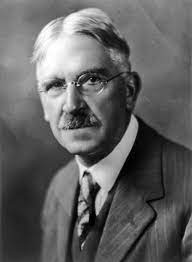Dewey, John

Bio: (1859-1952) American philosopher. John Dewey spent the most important part of his career at the University of Chicago, where he came in 1894, and there he worked closely with the founders of the Chicago School of sociology. Dewey acted within the philosophy of pragmatism started by William James, and he wanted to systematize James' teaching. In addition to philosophy, Dewey has made significant contributions in various fields of social sciences: social psychology, urban psychology, sociology of education, sociology of culture, political sociology, as well as in the study of the public sphere of society.
In his book Democracy and Education (1916), Dewey states that it is necessary to strengthen individualism and community at the same time. He believes that human habits are not a product of personal characteristics, but are a consequence of the institutional framework that exists in society. To change people's habits and strengthen both individualism and a sense of community, it is necessary to manifest deliberative intelligence within the community. He believes that educational institutions are the most important institutions which shape society, but also people's habits. That is why educational institutions must be as integrated as possible into the wider community. The public sphere refers to common interests within a community in which everyone feels the consequences of joint action. Accordingly, he believed that for most ordinary people, the best way to engage in democracy was to participate in local community decision-making.
Fields of research
City Civilization Civil Society Community Culture Democracy Education Freedom Human Nature Individualism Liberalism Personality Politics Psychology Social PolicyTheoretical approaches
PragmatismMain works
Psychology (1887);
The School and Society (1899);
How We Think (1910);
Democracy and Education: An Introduction to the Philosophy of Education (1916);
Reconstruction in Philosophy (1919);
Human Nature and Conduct: An Introduction to Social Psychology (1922);
Philosophy and Civilization (1931);
Art as Experience (1934);
A Common Faith (1934);
Liberalism and Social Action (1935);
Experience and Education (1938);
Logic: The Theory of Inquiry (1938);
Freedom and Culture (1939).

